
There are small questions in life, like:
What will I have for dinner?
And then there are bigger questions, like:
What should I study at university…And where?
Events like Careers Festivals, Fairs or Expos are a great way to explore your options and find out which university or area of study might be the right fit for you. It’s your opportunity to meet academics, experts and current students, and ask them every burning question you have about your future. To make the most of the day, you’ve got to be prepared.
Bond University’s Office of Future Students team has guided thousands of students through the university decision-making process. Here, they shared their words of wisdom for aspiring uni students on their way to careers expos and university events.
1. What are classes like?
Find out as much as you can about the learning environment. How many people are in a class? What facilities and equipment will you have access to as part of your degree? Is the curriculum solely based in written theory, or is there a strong practical element?
You can also ask about the access you will have to your lecturers and tutors, and if you can book personal consultations with them.
Learning about the classroom environment and overall experience will help you to imagine yourself at that university, or in that degree program, and determine if it fits.

2. What opportunities and support services are available to students?
How will the university help you graduate in a position to stand out in the workforce?
Lectures, tutorials and exams are only a part of the university equation. Ask about the additional services available to students, like career development support to assist with internships, career planning or building your resume. Then there’s help with assignments or academic writing, and opportunities like study tours, competitions, exchanges or work experience.
Likewise, university isn’t just about the study side of things. Find out about clubs and societies, and life on campus. University is an opportunity to make lifelong friends and networks, so you’ll want to make the most of it.
Find out what’s available, and how many students have access to those opportunities. In a large university, opportunities may be few and far between. But at a smaller and more personal institution like Bond, they’re likely to be accessible to more students.
3. How long will a degree take to complete?
Most traditional universities run two full semesters per year, with a long break between semesters. This means a standard bachelor’s degree will take around three years to complete, with a double degree taking at least five years. Some universities, like Bond, have an accelerated, three-semester-per-year timetable, which means a bachelor’s degree can be completed in two years – a full year ahead of the usual schedule.
Ask about the duration of your chosen program at different universities, and the value of completing your degree quicker and starting your career sooner.

4. What funding options are available?
Some universities will offer an Australian government loan scheme, like FEE-HELP or HECS-HELP. This means you don’t need to pay for your university fees upfront, and you’ll only begin to repay the fees once you’re in the workforce, and in proportion to your salary.
You might also like to ask about available scholarships for high achievers.
5. Ask yourself: What’s best for you?
There’s only one person who can answer this question: you.
Once you have all your university and study questions answered, it’s time to make a decision. Think about your goals, your strengths, how you learn best, and the kind of environment you will thrive in. From there, the decision should be easy – choose the place that’s right for you.
Ask us anything
You can meet our students and staff at Careers Festivals, Fairs and Expos – but there’s no need to wait. Chat with a current Bond student now.